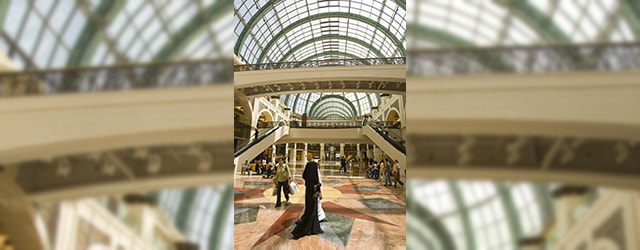With high per-capita incomes and strong mobile use, the GCC is poised for a surge in online shopping. Still, air-conditioned malls retain their allure.

Return to GCC Report
Amazon.com’s March deal to acquire Souq.com was a vote of confidence in the GCC’s fast-growing ecommerce market. Studies predict the sector will double or even quadruple in the next few years. Meanwhile, Saudi Arabia’s powerful Public Investment Fund, a leading Dubai mall operator, and others are investing $1 billion in ecommerce upstart noon.com, which aims to battle Amazon for the region’s online shoppers.
Mall culture is firmly entrenched in the Gulf Cooperation Council countries, where summer temperatures can top 120 degrees Fahrenheit. Still, more and more residents shop online. In the United Arab Emirates, 56% of consumers shop online at least once a week, up from 39% last year, according to a study by Dubai’s Department of Economic Development and Visa.
Syrian entrepreneur Ronaldo Mouchawar, CEO and co-founder of Souq.com, says joining Amazon will let the largest online marketplace in the Arab world offer a wider product selection. Souq.com features more than 8.4 million products; Amazon, about 400 million products. Noon.com plans to launch in Saudi Arabia and the UAE with 20 million products.
Mouchawar believes that Souq.com will benefit from Amazon’s investment in technology and its “great track record of empowering sellers locally and globally.”
Meanwhile, Mohamed Alabbar—who chairs Dubai property company Emaar, which developed the world’s tallest skyscraper and operates the Dubai Mall, the largest in the world by area—began building an ecommerce empire well before his last-minute $800 million counteroffer for Souq.com was turned down in March. Last year, Alabbar led two investment groups that bought a combined 16.5% stake in Aramex, a regional logistics firm. Also last year, he acquired a 4% stake in Italian online fashion platform Yoox Net-A-Porter and formed a joint venture. More recently, Emaar Malls purchased a 51% stake in ecommerce fashion website Namshi for $151 million in cash. Another Alabbar fund acquired UAE ecommerce site JadoPado.
Emaar Properties plans to sell as much as 30% of its real estate development business in the UAE in an initial public offering. The shares will be listed on the Dubai Financial Market, and the majority of proceeds will be distributed to Emaar’s shareholders as a dividend. The IPO is expected to be the largest in the UAE since Emaar Malls raised $1.6 billion in 2014.
Another Dubai-based mall and retail group, Majid Al Futtaim, is taking a hybrid approach to ecommerce, believing that customers will continue to enjoy shopping and dining at its malls. The company recently partnered with Fetchr, a Dubai-based start-up, to offer what it calls “hands-free shopping,” for home delivery of products selected at the mall.
A.T. Kearney concluded from a study last year that the online retail market in the region could reach $20 billion in 2020, up from $5.3 billion in 2015. “With some of the world’s highest levels of GDP per capita, the region is home to many people with large disposable incomes. Average mobile penetration stands at 170%,” the consulting firm says. “Several obstacles are preventing this market from reaching its full potential, including consumer trust and awareness issues; shortcomings in the payments, distribution and logistics infrastructure; and embryonic government policies.”
The Cairo-based Arab Federation for e-Commerce was established recently to promote regulatory and legislative initiatives to help the market grow. The AFEC seeks collaboration between Arab governments to develop harmonized laws and regulations. It plans to develop an electronic platform to enable ecommerce between member countries: Saudi Arabia, the UAE, Egypt, Kuwait, Lebanon and Jordan.



